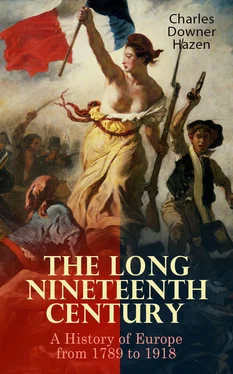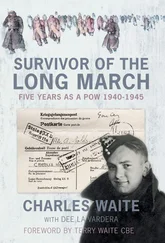Ten days later the Assembly followed. The King and the Assembly were now under the daily supervision of the people of Paris. In reality they were prisoners. Versailles was definitely abandoned. From this moment dates the great influence of the capital.
A single city was henceforth always in position to dominate the Assembly. The people could easily bring their pressure to bear for they were admitted to the thousand or more seats in the gallery of the Assembly's hall of meeting and they considered that they had the freedom of the place, hissing unpopular speakers, vociferating their wishes. Those who could not get in congregated outside, arguing violently the measures that were being discussed within. Now and then some one would announce to them from the windows how matters were proceeding in the hall. Shouts of approval or disapproval thus reached the members from the vehement audience outside.
Chapter IV
The Making of the Constitution
Table of Contents
The States-General which met in May, 1789, had in June adopted the name National Assembly. This body is also known as the Constituent Assembly, as its chief work was the making of the constitution. It had begun work upon the constitution while still in Versailles and the first fruit of its labors was the Declaration of the Rights of Man, a statement of the rights which belong to men because they are human beings, which are not the gift of any government. The Declaration was drawn up in imitation of American usage. Lafayette, a hero of the American Revolution, and now a prominent figure in the French, brought forward a draft of a declaration just before the storming of the Bastille. He urged two chief reasons for its adoption; first it would present the people with a clear conception of the elements of liberty, which, once understanding, they would insist upon possessing; and, secondly, it would be an invaluable guide for the Assembly in its work of elaborating the constitution. All propositions could be tested by comparison with its carefully defined principles. It would be a guarantee against mistakes or errors by the Assembly itself. Another orator paid a tribute to America, explaining why "the noble idea of this declaration, conceived in another hemisphere" ought to be transplanted to France. Opponents of the proposal declared it useless and harmful because the Declaration bound to distract the members from important labors, as tending to waste time on doubtful generalizations, as leading to hair splitting and endless debate, when the Assembly's attention ought to be focused on the pressing problems of legislation and administration. The Assembly took the side of Lafayette and, after intermittent discussion, composed the notable document in August, 1789. As a result of the events of October 5, described above, the King accepted it. The Declaration, which has been called "the most remarkable fact in the history of the growth of democratic and republican ideas" in France, as "the gospel of modern times," was not the work of any single mind nor of any committee or group of leaders. Its collaborators were very numerous. The political discussions of the eighteenth century furnished many of the ideas and even some of the phrases. English and American example counted for much. The necessities of the national situation were factors of importance.
The National Assembly has often been severely criticised for devoting time, in a period of crisis, to a Declaration which the critics in the same breath pronounce a tissue of abstractions, of doubtful philosophical theories, topics for everlasting discussion. "A tourney of metaphysical speculations" is what one writer calls it. But a study of the situation shows that the idea of a declaration and the idea of a constitution were indissolubly connected. The one was essential to the other in a country which had no historic principles of freedom. French liberty could not from the nature of the case, like English liberty, slowly broaden down from precedent to precedent. It must begin abruptly and with a distinct formulation. After the enunciation of the principles would naturally come their conversion into fact.
The Declaration of the Rights of Man laid down the principles of modern governments. The men who drew up that document believed these principles to be universally true and everywhere applicable. They did not establish rights - they merely declared them. Frenchmen well knew that they were composing a purely dogmatic text. But that such a text was extremely useful they believed. And the reason why they believed this was that they had a profound faith in the power of truth, of reason. This was, as Michelet pointed out long ago, the essential originality of the Constituent Assembly, this "singular faith in the power of ideas," this firm belief that "once formed and formulated in law the truth was invincible." These political dogmas seemed to the members of the Assembly so true that they thought they had only to proclaim them to insure their efficiency in the actual conduct of governments. These men believed that they were inaugurating a new phase in the history of humanity, that, by solemnly formulating the creed of the future, they were rendering an inestimable service, not to France alone but to the world. Though America had set an example, it was felt that France could 'perfect' it for the other hemisphere and that the new declaration might perhaps have the advantage over the other of making "a loftier appeal to reason and of clothing her in a purer language."
The seventeen articles of this creed asserted that men are free and equal, that the people are sovereign, that law is an expression of the popular will, and that in the making of it the people may participate, either directly, or indirectly through their representatives, and that all officials possess only that authority which has been definitely given them by law. All those liberties of the person, of free speech, free assembly, justice administered by one's peers, which had been worked out in England and America were asserted. These principles were the opposite of those of the Old Regime. If incorporated in laws and institutions they meant the permanent abolition of that system.
As a matter of fact the expectation that the Declaration would constitute a new evangel for the world has not proved so great an exaggeration as the optimism of its authors and the pessimism of its critics would prompt one to think. When men wish anywhere to recall the rights of man it is this French document that they have in mind. The Declaration long ago passed beyond the frontiers of France. It has been studied, copied, or denounced nearly everywhere. It has been an influence of indisputable factor in the political and social evolution or modern Europe. During the past century, whenever a nation has aspired to liberty, it has sought its principles in the Declaration. "It has found there," says a recent writer, "five or six formulas as trenchant as mathematical propositions, true as the truth itself, intoxicating as a vision of the absolute."
The Declaration was, of course, only an ideal, a goal toward which society should aim, not a fulfilment. It was a list of principles, not the realization of those principles. It was a declaration of rights, not a guarantee of rights. The problem of how to guarantee what was so succinctly declared has filled more than a century of French history, and is still incompletely solved. We shall now see how far the Assembly which drafted this Declaration was willing or able to go in applying its principles in the constitution, of which it was the preamble.
The constitution was only slowly elaborated. Some of its more fundamental articles were adopted in 1789. But numerous laws were passed in 1790 and 1791, which were really parts of the the new constitution. Thus it grew piece by piece. Finally all this legislation was revised, retouched, and codified into a single document, which was accepted by the King in 1791. Though sometimes called the Constitution of 1789, it is more generally and more correctly known as the Constitution of 1791. It was the first written constitution France had ever had. Framed under very different conditions from those under which the constitution of the United States had been framed only a short time before, it resembled the work of the Philadelphia Convention in that it was conspicuously the product of the spirit of compromise. With the exception of the vigorous assertions of the Declaration of the Rights of Man, which was prefixed to it, the document was marked by as great a moderation as was consistent with the comprehensive changes that were demanded by the overwhelming public opinion, as represented in the cahiers. It is permeated through and through with two principles, the sovereignty of the people, all governmental powers issuing from their consent and will, and the separation of the powers sharply from each other, of the executive, the legislative, and the judicial branches, a division greatly emphasized by Montesquieu as the sole method of insuring liberty.
Читать дальше












